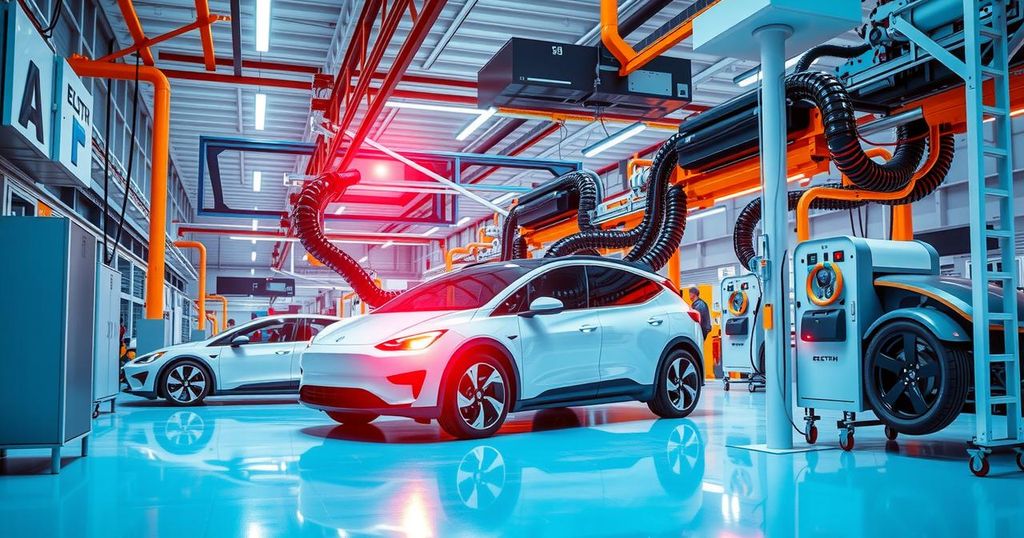BYD to Build a Plant in India: Reshaping the EV Landscape

BYD is establishing its first EV manufacturing plant in Telangana, India, amid rising trade barriers in Western markets. The company is motivated by lower tariffs and government incentives in India. BYD, a leading global EV maker, is known for its innovative Blade Battery technology. The Indian EV market is rapidly growing, expected to thrive under government policies, leading to intensified competition among local manufacturers like Tata and Mahindra.
Chinese electric vehicle (EV) manufacturer BYD is set to build its first plant in India, specifically in the Rangareddy district of Telangana. This factory will focus on producing EVs and batteries, marking a significant move in BYD’s global expansion strategy. Increasing tariffs in Western markets compel companies like BYD to seek new opportunities, especially in countries with growing EV demand like India.
The motivation for BYD’s entry into India stems from rising trade barriers. The European Union has enacted tariffs as high as 35.3 percent on Chinese EVs, with specific levies on BYD vehicles increasing the effective tariff to approximately 27 percent. The U.S. has similarly intensified tariffs on Chinese EV imports, making India—a market with lower tariffs and government incentives—a more appealing prospect for BYD’s expansion.
BYD, founded in 1995, has evolved from a battery manufacturer into a leading global EV manufacturer since its automotive entry in 2003. With technological innovations such as the Blade Battery—a lithium iron phosphate (LFP) battery recognized for its safety, energy efficiency, and vertically integrated production model—BYD has significantly reduced production costs and reliance on external suppliers.
BYD’s Blade Battery offers exceptional safety and efficiency, capable of enduring harsh conditions. It successfully passed rigorous tests, showing no fire risk from nail penetration, unlike conventional lithium-ion batteries. This technological advancement not only reduces fire risks but also improves energy efficiency by optimizing space utilization within the battery structure.
In terms of charging capabilities, BYD has made impressive advancements. Its Super e-Platform allows for 470 kilometers of range in just five minutes of charging, significantly shortening charging times compared to competitors like Tesla, which requires 15 minutes for the same range. BYD aims to introduce all-solid-state batteries by 2027, further enhancing charging efficiency.
In the global EV landscape, BYD shows strong performance, reporting over $107 billion in revenue and 4.27 million vehicle sales in 2024, outpacing Tesla’s 1.79 million units sold. With an established foothold in China, where it holds a market share of 32 percent of new energy vehicles (NEVs), BYD is also broadening its international presence, including recent expansions to Thailand, Brazil, Hungary, and now India.
India’s EV market is burgeoning, constituting only 2.5 percent of total passenger vehicle sales but increasing at a projected CAGR of 43 percent. By 2030, India aims for EVs to represent 30 percent of all passenger vehicle sales, supported by government initiatives and reduced tariffs on EV components. The local manufacturing of EVs is also experiencing growth, with notable increases in production year-on-year.
Leading local players in the Indian EV sector include Tata Motors, Mahindra Electric, and MG Motor India, with Tata holding a market share of about 38 percent. As Tesla also plans to enter the Indian market, competition in the EV sector is expected to intensify, particularly as BYD seeks to replicate its Chinese success in this emerging market.
Tesla has recently experienced a decline in its market share in China, dropping significantly and prompting them to strategize for the Indian market. BYD’s rising dominance globally, coupled with Tesla’s challenges, sets a complex competitive stage. Observers are keen to see how this rivalry evolves, particularly concerning pricing and technological advancement.
The entry of BYD into India may disrupt the existing competitive dynamics. It is expected to stimulate price competition and technological progress among domestic players like Tata Motors and Mahindra. The future success of BYD in India will depend heavily on regulatory landscapes, infrastructure for charging, competitive pricing, and local rival advancements.
BYD’s strategic entry into India’s EV market is poised to significantly alter the competitive landscape, potentially leading to increased innovation and price competition among local manufacturers. The company’s advanced battery technology and efficient production strategies position it favorably in an emerging market characterized by rapid growth. As Indian EV sales rise, driven by government incentives and changing consumer preferences, BYD’s development could enhance overall consumer adoption of EVs, emphasizing the need for comprehensive infrastructure and regulatory support to fully leverage this potential.
Original Source: www.business-standard.com





